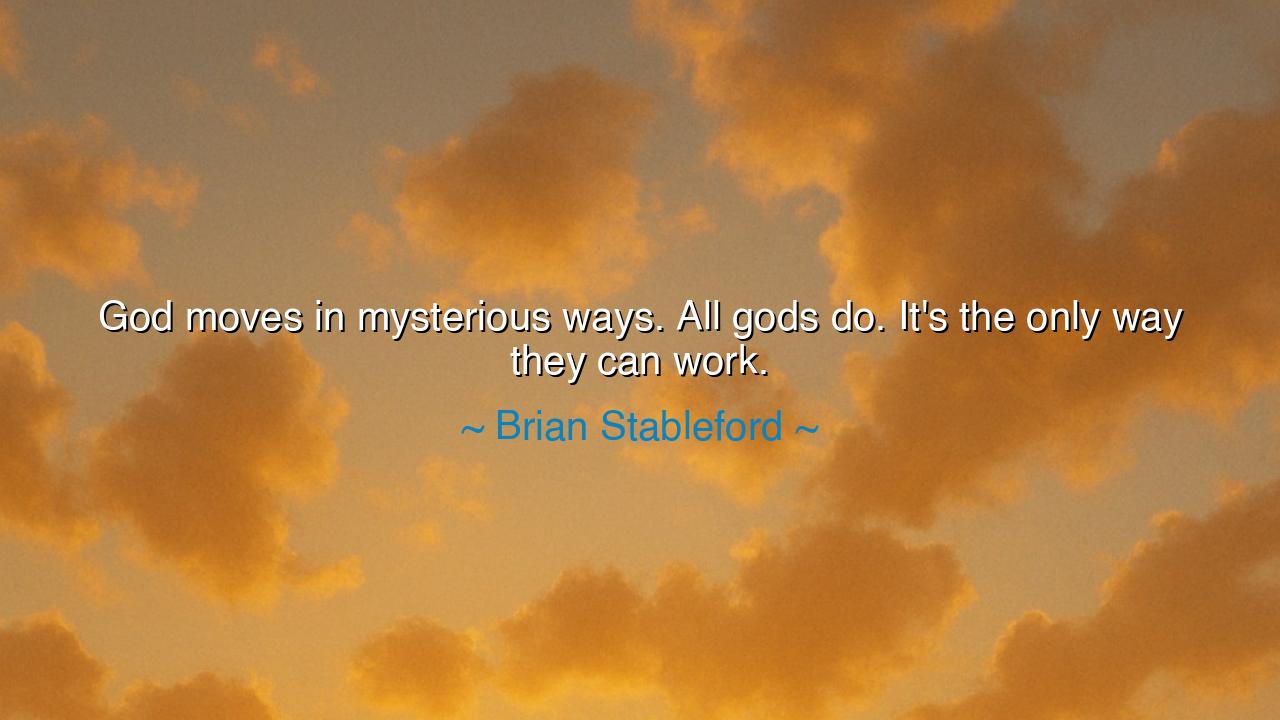
God moves in mysterious ways. All gods do. It's the only way






The words of Brian Stableford, “God moves in mysterious ways. All gods do. It’s the only way they can work,” resound like an echo from the dawn of faith. They remind us that the divine is never bound to the simplicity of human reason. To call the ways of God mysterious is to admit that eternity cannot be measured by the tools of mortals. The sacred must veil itself, for if it were wholly revealed, its majesty would overwhelm the fragile vessel of the human mind.
In these words lies the ancient recognition that all gods—whether of scripture, myth, or imagination—sustain their power through mystery. For when the divine acts in hiddenness, it awakens awe, wonder, and the trembling of reverence. The unseen hand commands more devotion than the visible one, for what is concealed stirs the heart with questions that reason cannot silence. Thus, mystery becomes the breath of faith, and faith becomes the bridge between man and the eternal.
The origin of this saying is born from Stableford’s pen, a voice steeped in both science fiction and philosophy. He wove together the threads of belief and speculation, showing that whether in myth or modern tale, the divine endures only by moving beyond the grasp of human certainty. In doing so, he reflects the wisdom of the ancients, who clothed their gods in paradox and symbol, knowing that truth wrapped in mystery has greater power than truth laid bare.
Let this teaching endure: do not curse the mysterious ways, for they are the language of the infinite. What is hidden may yet be holy, and what is veiled may yet guide. Just as the stars shine though they are far beyond reach, so too does the divine work in silence, in shadow, in unseen paths. And the wise will not demand to understand all, but will learn to walk in trust, knowing that in mystery lies the breath of the sacred.






PUPhuong Uyen
This quote makes me think about how much of faith is built on mystery. If gods move in mysterious ways, are we meant to question and explore, or are we meant to accept without understanding? Does this create a sense of awe or frustration for us as believers? How do we reconcile the desire for clear answers with the inherent uncertainty that seems to be part of religious experience?
T2Huy Thuc 28-Nguyen
I find it interesting that Stableford frames gods’ mysterious ways as the only way they can work. Does this mean that mystery is a necessity for divine power, or is it simply a tool to keep humans engaged and reflective? If divine actions were transparent, would they lose their sense of awe and reverence? I wonder if mystery in the divine is not just a way to work, but a means of deepening faith through uncertainty.
MVPhan Thi Mai Vy
This quote resonates with the idea that divine power is beyond human comprehension. Does the notion of mysteriousness in godly acts allow for more room to explore different beliefs or faith systems? What if gods are mysterious precisely because they want us to question everything? Is there a purpose in leaving certain things unexplained? Perhaps, by being mysterious, gods open up space for wonder, doubt, and deeper exploration in the human spirit.
TPthai Pham
I find this quote thought-provoking, especially the idea that gods work mysteriously. Does this imply that human understanding is limited by design? Why would a divine being choose to work in ways that are unclear to us? Could it be that by keeping their methods mysterious, gods encourage growth in faith and humility, asking us to trust without understanding? I'd love to hear if anyone else feels similarly about divine mystery.
TTthuy tien
Brian Stableford’s quote suggests that the mystery around gods is essential to their power. It makes me question how we, as humans, react to things we can't explain or understand. Do we find comfort in the mystery of divine actions, or does it frustrate us? How do we reconcile our need for answers with the idea that some things are just beyond our comprehension? This balance seems crucial to faith.